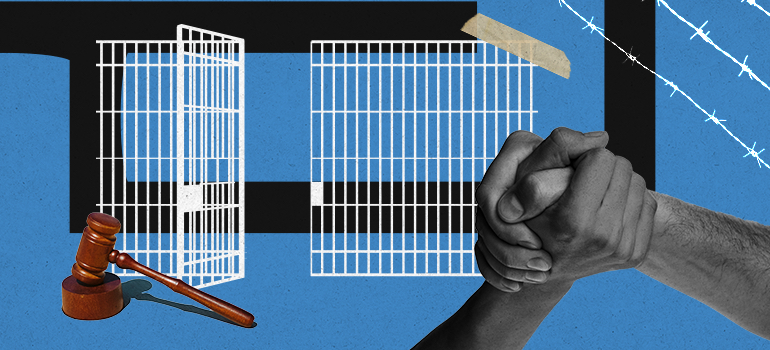Safety and Justice Challenge (original) (raw)

The Safety and Justice Challenge is reimagining and rebuilding local criminal justice systems — reducing jail incarceration and increasing equity for all.
Jails have almost 19x the number of annual admissions as prisons.
Three out of five people held in jail have not been convicted of any crime.
Nearly 75% of people in jail are there for nonviolent traffic, property, drug, or public order offenses.
Black people are jailed at almost 4x the rate of White Americans.
Jails are misused and overused in ways that damage families, devastate communities, and ultimately lead to more crime.
Finding Solutions
The Safety and Justice Challenge invests in locally developed, equity-based solutions that take a balanced approach to protecting public safety, including:

Our goal is to:
Our goal is to safely reduce jail populations across all Safety and Justice Challenge jurisdictions by 2025 and eliminate racial inequities. We’re providing practical support and scaffolding to communities that are taking bold action in response to centuries of institutional and systemic racism, honoring the expertise of directly impacted communities, and working together to achieve transformational change.

57Counties, Cities, and States
16%of the nation's jail beds
20%network-wide jail incarceration reduction to date
Ayanna Lyons from the @PhiladelphiaGov's Office of Criminal Justice shares how the SJC has helped her team gain access to and build relationships with various stakeholders and collaborators across the criminal justice system. #RethinkJails
Sleeping in Tucson washes can now result in jail time for homeless people under a new city ordinance, but stable housing and resources do more to keep our communities safe than jail. #RethinkJails
Nearly 450 people in MO who have been charged with crimes but not convicted are in need of mental health treatment and waiting in jail for a hospital bed. Many are detained for longer than if they’d received the maximum sentence for their charges.
2/3 of Black men with disabilities will be arrested before their 28th birthdays. A new report from @activatingchnge calls for disability and Deaf communities to be included in the development and implementation of all criminal justice reforms.
Community violence intervention works. Chicago offers proof: violence numbers have been dropping since 2021, thanks in part to @nonviolencechi’s ability to build trust with both the community and the local police district. #RethinkJails
A new report from @bailproject finds that cash bail has no measurable impact on whether people return to court. The report calls into question a system that jails legally innocent people based solely on their financial means. #RethinkJails
“The medical mistreatment of women and pregnant people in correctional facilities is a clear example of how the carceral state functions to harm people, not rehabilitate them.” - @iii_rame for @thenation #RethinkJails
65–70% of youth in juvenile detention have disabilities, compared to only 4.3% of all students nationally. A new report from @accessliving calls for developing and implementing disability mentoring programs for youth with disabilities and their families.
Hosted partly by the SJC, the Sequential Intercept Model Mapping Workshop in Pima County, AZ recently brought together national and local leaders to discuss how to divert people with mental illness and substance use disorders from jail and prison.
When a hate crime happens, the local government is first to respond. That's why all municipalities need this survivor-informed resource to establish best practices for preventing and responding to hate crimes, especially in this heightened era of hate.
Hundreds of Pennsylvanians are languishing in jail because they're considered mentally unfit to stand trial. Allegheny County has created the state's first mobile clinic to treat those who've been charged with a crime but can't aid in their own defense.
Reminder to lawmakers across the US wishing the LGBTQ+ community a Happy Pride Month: Lesbian, gay, & bisexual people are 2.25x more likely to be arrested than straight individuals.
It’s time to stop the criminalization of LGBTQ+ people.
🚨New @jsp_partners report: Collecting information about people prior to initial court appearances can make the justice system more fair and reduce the number of people in jail unnecessarily before their trial. Read how 3 counties are leading the way 👉 https://bit.ly/3ZU2apC
Mass incarceration costs American families with incarcerated loved ones a staggering $348 billion annually in lost earnings and out-of-pocket spending. @meg_anders shares the findings of @fwdus' new report on the true cost of prisons and jails for @npr.
None of Louisiana’s local jails provide adequate care for incarcerated women, according to a new state audit. The report cites a lack of health screenings and failure to meet healthcare needs during and following pregnancy. #RethinkJails https://bit.ly/43uf1Ba
LGBTQ+ capital defendants face unique and complex discrimination in the American capital punishment system. @theappeal found that anti-LGBTQ+ bias impacted more than half of two dozen criminal court cases in which LGBTQ+ defendants faced the death penalty.
Women often experience multiple systemic failures long before facing arrest. Read @RSI’s new post on why prevention matters, early intervention strategies, and potential solutions to keep women out of the system. #RethinkJails
The 2020 George Floyd protests sparked a movement for criminal justice reform in the Bay Area, but five years later, the pendulum is swinging back. In San Francisco, many reforms remain in limbo, especially as Mayor Lurie moves to expand police staffing.
An independent report finds Milwaukee County has made “measurable and meaningful progress” in improving jail conditions, including ending unsafe restraint practices and updating suicide prevention protocols, but work remains to ensure lasting improvements.
It’s been over a year since the Department of Justice launched a civil rights investigation into Charleston County Jail, but its status remains unclear – even as more deaths occur behind bars. Families deserve answers and justice. #RethinkJails